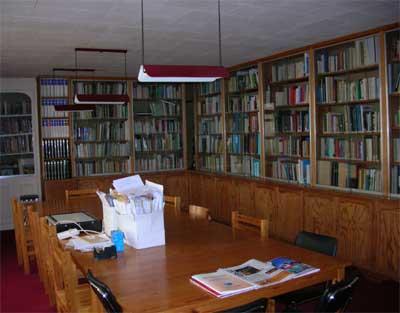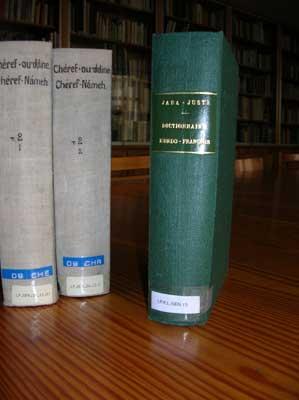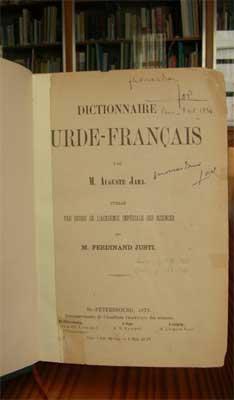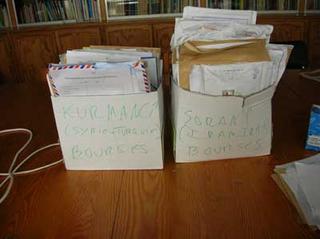The statute of Kurds in the new Iraqi Constitution

Having recalled the different dispositions and provisionnal laws in Iraq since the liberation, Saywan presented the play of the 3 mains groups which have debated on the Constitution : Kurds, Sunnites and Shiites and the impossibility to make an agreement before August 15th.
Sunnites would have like a dossilution of the Assembly and the organisation of new elections. Kurds were not against it, for it would have not changed their own score but Shiites refused, fearing that their majority would be less important if Sunnites vote (they have boycotted the last elections). So the Committes had asked a delay of 3 days and at the end on August 28th, a provisionnal text had been presented (40 points shoud be decided later).
In majority, Sunnites are against this Constitution. But as they have not been elected, only "designed" as representative of their group, they are not in a strong position. Some of them are Baasists, some other moderate.
The current project had not been modified, except for changing the competences of central government concerning the issue of Tigris and Euphrat waters, for it is an international question between iraq, Syria and Turkey.
The main discussed points :
The identity of Iraq :
- I, 3 : Kurds' proposal was to mention a multiethnical Iraq. There was a debate on the former sentence "Iraq is a part of the Arab nation." Of course Kurds wanted to suppress it. Arabs proposed to write "the Iraqi territory is a part of the Arab nation", but as Saywan said, a territory could not be a part of a human group, so it has non sense. So an else formula has been adopted : "the Iraqi Arabs are a part of the Arab nation and Iraq is a founder member of the Arab League of which it respects the agreements, and formed a part of the Moslem world" (this to satisfy the Shiites).
The Constitution :
It is the result of a compromis between the 3 groups. We should analyse it in 2 sections, one concerning Iraq in general and the secund for the Kurdish Region.
We have to notice that it is the first permanent Constitution in Iraq since 1958, all the former were provisionnal because of internal and international conflicts.
After a very poetic preamble, recalling that the Iraqis are the children of Mesopotamia, that Iraq saw on its ground appearing the first law, the first writing, etc, the important points of the Constitution relate to: :
- The name of this state ? Kurds wished to call it "Federal republic of Iraq", and Shiites : "Islamic Republic of Iraq". Sunnites supported Shiites's choice because they were absolutely opposed to a "Federal republic." So it stays "Republic of Iraq", and in the text, it is mentionned as a "democratic, federal, representative (parlementary) repubublic. "
- State and Islam : As we have said, Shiites and Sunnites wished (or were not against) an Islamic Republic and islam as the unique source of Law. Kurds could not accept it , because they refuse all kind of dependance to a religious hierarchy (Shiite clerks are very influent). Then Kurds objected the numerous religious minorities in Iraq : Christians, Yezidis, Shabaks, Sabeans, etc. And islamic law could have differences between Shiite and Sunnit laws : For example "temporary marriage" does not exist for Sunna but is a Shiite institution. So Kurds obtained that islam is only quoted as "one of the sources" of Law, but not the unique.
Kurds have succeed to impose that other minorities'religious rights were stated in the Constitution (article 2) : "This constitution guarantees the Islamic identity of the majority of the Iraqi people and the full religious rights for all individuals and the freedom of creed and religious practices like (Christians, Yazidis, Sabaean Mandeans.)".
If we compare this constituion with most of those which rule the Arab world, it is very modern and advanced. It guarantees freedom for trade-union, political, for press, circulation of people, it condemns torture, degrading punishments. It allows the right to have a double nationality except for high representative of government, the right to education, health, the private property and market economy.
- On woman's statute : Kurds wanted a quota of 40% of women in National Assembly. At the end, only 25% had been accepted. Women have all rights to have a political and offcial activity.
Political institutions of federal Iraq:
At the head of the State, there are a president, a Prime Minister and two assemblies. It is a parliamentary system. President's power is quite honorary in spite of prerogatives. The exercise of the government belongs to the Prime Minister, but is controlled by the National Assembly.
The Regional Assembly :
We have few information on this institution, because it should be defined in a later law. Though this assembly which will guarantee the rights of regions, and thus the rights of Kurdistan.
Kurdistan (or Federal Region of Kurdistan) :
The Shiites wanted to also create their own area, but the sunnites are opposite there, because of the question of the natural resources (the oil of al Basra). Sunnites accept Kurdistan for they can not prevent it, but But they are opposed so that the Shiites follow the movement. However best would be to divide Iraq as follows: the area of the Holy Cities (Kerbelah, Najaf), that of al Basra, the area sunnite, Kurdistan.
About the Region, all the Kurdish claims have been accepted, except two: the name of "federal republic" as we saw, and the right in 6 or 8 years, to make a Kurdish referendum on selfdetermination. But the Arabs refused it. So the components of the Iraqi people are presented as forming a "free union" as long as the Constitution will not be modified. This "Iraqi union" can thus be broken at each constitutional change. T
Language :
In article 4 it is stipulated that Kurdish and Arabic are the two official languages of Iraq. Firstly the sunnites had required that Arabic be the language of Iraq and Kurdish the official language of the Kurdish area only, but one could then wonder in which language the two entities were going to be able to communicate. It should be remembered that 60% of the Kurds of Iraq do not speak Arabic. In addition, the Kurds asked and obtained that the other languages be mentioned, as Turkmen or Syriac, and the right of these minorities to educate their children in their mother tongues.
Respective competences of the central government and the Regions :
The government has only 9 exclusive competences ( all others belong to regions) : Foreign policy, diplomacy, economical policy, monetary, national defense, customs, telecommunications, hydraulic resources , census of the population, etc.
In reality however, much of these "exclusive" competences are assumed by regions because of the weakness of the central State. There are also "shared" competences which encroach even on the field of exclusive competences, thus for customs, distribution in water/electricity, environment, health, education etc, which is also support by regions.
Competences of regions :
Regions can change the laws which are not included in the exclusive competences of the central government. they can have their own representation in foreign countries (as Québec) and can rule economical, social and juridic questions. Region rule themselves and organize their own safety (police, army, militia).

Kurds have especially three aims for the future :
The question of Kirkuk, Xaneqîn, etc. :
The article 58 of the former provisionnal law about the return of expelled people in their homeland and the restitution of their good and properties has not been applied in reality since 14 months. Arabs accepted this article in the new Constitution but they did not want a deadline in the agenda. Kurds refused, because they were afraid to wait for one century ! Then Arabs proposed a delay of 10 oo 20 years. Kurds refused again. Finally, Kurds should come back in their homes before December 31 2007, and Arab colonists should leave. By a referendum, inhabitants will choice if they will be integrated or not in the Kurdish Region. But the governorate of Kirkuk had been shared between several districts by Saddam. It is necessary to restaure it before. Arabs object so that ALL the governorates were changed by Saddam and then, logically, they ought to rebuilt all the system of districts, and not only the Kirkuki one.
Another Kurdish claim is oil income. Kurds asked firstly that 60% profit to Kurdistan and 35% to the Central Government. But it has not been accepted. Then they conclude an alse agreement : current oil resources are for Bagdad, but any new oilfield discovered in Kurdistan would be the property of the Region.
Peshmergas :
Kurds wanted to keep their defence, even if Shiites threatened to keep then some militias as Sadr's. Now each region has its own "guards", and calls them as it likes. Kurdistan calls its guards "Peshmergas of Kurdistan".
Other problems :
- Iraqi flag and hymns :
Both are explicit references to Arab nationalism and are categorically refused by the Kurds because it is under these colors that they have been genocized. This flag coulds be seen in Silêmanî but is absolutely forbiden in Hewlêr/Erbil. Last July, the Consul of the USA refused to go to the reception organized by the Kurds for celebrating the American Day, pretexting that in the building (and all the city) did not float the Iraqi flag (the same one as under Saddam but without the pious formula writes with the hand and the blood of the deposed raïs) but only Kurdish colours. Some Kurds reacted by asking if after the fall of Reich in 1945, they would have required that the Nazi flag continue to float on the concentration camps...
A new Iraqi flag should be voted and decided later.
How could we be sure that this Constitution will be respected and applied to the ground?
This Constitution is very rigid and let a few power to the central government. It is based entirely on a concept "of voluntary union" between the two major people of Iraq, the Arabs and the Kurds. Many of these provisions require the 2/3 of the Parliament to be changed and the Parliaments of the areas can decide to accept them or reject by referendum.
On the ground, of course, all depends on the way in which the American occupation will continue, or if the troops will be withdrawn and when. But in reality, we can say that Kurdistan is finally made up and has a political legitimacy which Iraq cannot reconsider. On October 15 the text of the Constitution will be the subject of a referendum. It will be probably approved, for the main Kurdish parties and Shiites do not contest it and will invite their sympathizers to vote for it.
Question/Answers:
Q. : How about the situation of Mosul ?
A. : Mosul is ethynically very mixed and is a complex ground. The city can approximately be divided in two banks, the right-hand side and the left (of the Tiger). The left bank is populated Kurds, Christians, Yezidis, Shabaks, etc, and is controlled by the Kurdish forces. The right bank has an Arab population, sunnite in majority, with much former and current Baasist (among the old republican Guard of Saddam, 20,000 of them came from Mosul). Because of the insecurity and the presence of terrorist groups, *areas of the north of Mosul wish more and more to be attached to Kurdistan, which one can plan to make by making them pass in the districts of Kirkuk or Dohouk. The right bank it, is controlled by the Americans in the daytime, by the terrorists in the night.
Q. : How Sunnites and Shiites Kurds manage their religious difference ?
R. : Religious identity is not the most important in Kurdicity, opposing to Iraqi Arabs. Thus, Kurdistan is currently ruled by an Assyrian (Christian), the Vice-Prime Minister when the PM is out of the country. The most important is to be "Kurdistani".
Q. : How much peshmergas are there in Kurdistan ?
R. : Officially today, we count 37,000 peshmergas from PUK and between 50 and 60 000 peshmergas from the DPK. But in truth, only 15,000 men were correctly involved and are operational. It is not desirable to employ some more, because Kurdistan suffers from a lack of workers (because of the war, exiles, the genocide) at such point that it plans to call upon immigrants.
Q. How could we be sure that the article 58 on the return of the deportees of Kirkuk and the departure of the Arab colonists will be really applied?
R. : it is stipulated that this article will have to be applied before 30/12/2007. If not, as for all the articles of the Constitution, its non-observance will break "the free union of Iraqi" on which this Constitution is based. The Americans oppose sometimes to the return of the refugees. Some Christians, who had reinvested a village, were dislodged by US soldiers, who brought back the colonists! But the Kurds and the others return all the same, and recover their goods. Around Kirkuk, 55% of the Kurdish fields were taken again by their owners. It is estimated that between 170 and 200,000 Kurds returned to Kirkuk.
But there are no only colonists: Civils servant, too. The Arab employees of the Oil Northern Company had been transferred to Kirkuk, according to the Baasist policy to employ Arabs in Kurdish country. Among 178,000 employees of the Oil Northern Company only 180 employees are Kurds, in subordinate positions. But it is delicate to claim a "purification" of all the foreign civil servants in Kurdistan. In the field of health, of education, for example, these people are in Kirkuk because they were transferred there, and not by choice.








